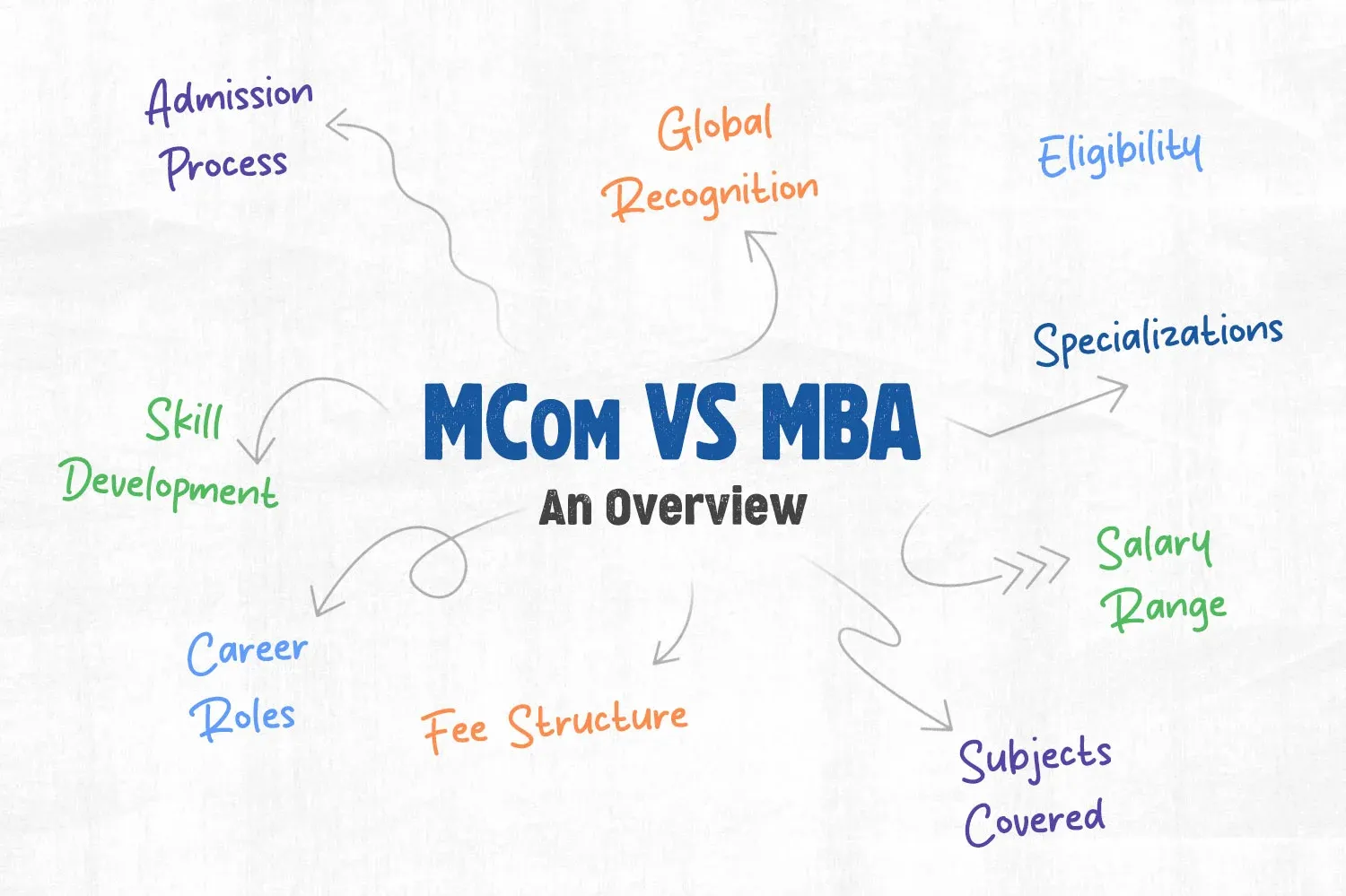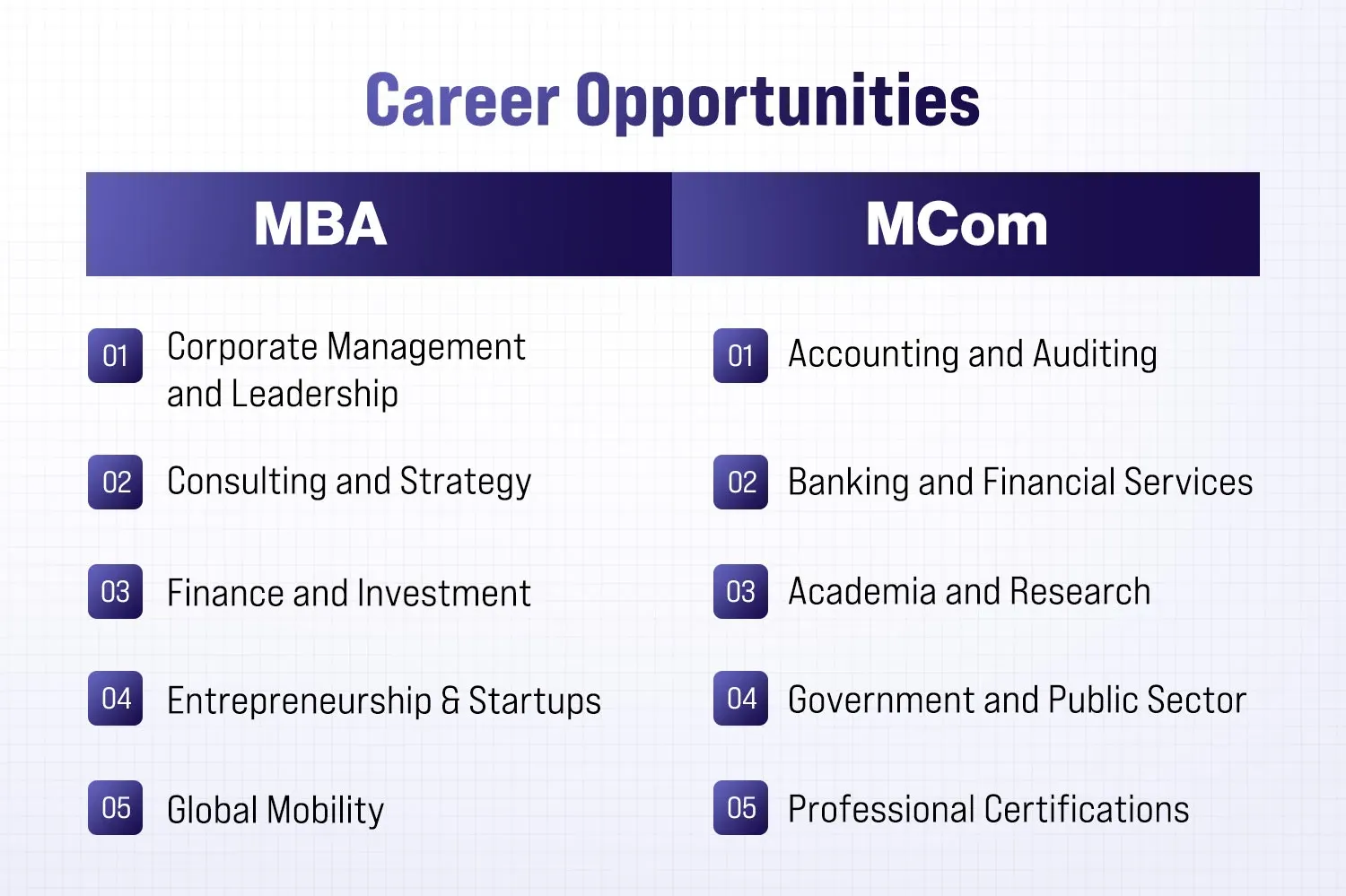MBA or MCom: Which is Better?

Postgraduate business education is an essential qualification for individuals seeking career advancement, leadership roles, and industry-specific expertise. Among these, the MBA and MCom programs are two prominent pathways offering distinct opportunities to graduates.
An MBA is generally better for those seeking diverse leadership and management roles across various industries, emphasizing broad business knowledge and strategic decision-making.
An M.Com, conversely, is better suited for specialized careers in finance, accounting, commerce, research, and academia, providing in-depth theoretical and analytical knowledge in these areas.
Hence, differing views persist on whether an MBA or MCom offers better ROI. This article compares MBA and MCom based on salary prospects, skill development, and career scope to guide students to make informed choices.
What is MCom?
MCom, or Master of Commerce, is a two-year postgraduate program that delivers specialized expertise in commerce-related disciplines such as finance, accounting, economics, and business administration. It focuses primarily on the theoretical and applied aspects of commerce and finance, making it ideal for students who wish to deepen their expertise in the domain of finance.
The MCom program offers specializations like accounting, finance, economics, statistics, and business management, effectively preparing graduates for careers as accountants, financial analysts, share brokers, and business executives.
What is an MBA?
MBA stands for Master of Business Administration, a prestigious postgraduate degree designed to develop advanced business and managerial skills. First established in 1908 by the Harvard University Graduate School of Administration (now Harvard Business School), the MBA has since become the gold standard for leadership and management education worldwide.
A Master of Business Administration provides a robust foundation in finance, marketing, operations, strategy, and leadership, along with specializations in entrepreneurship, international business, and technology management. This versatile degree serves professionals across industries who are seeking career advancement, increased earning potential, or successful transitions into new roles.
According to the Graduate Management Admission Council (GMAC), the degree is highly valued for its potential to enrich personal growth, enhance leadership potential, and provide long-term career mobility.
MCom vs MBA: An overview

Let's explore a comparative table that differentiates MBA (Master of Business Administration) and MCom (Master of Commerce) based on key academic, professional, and practical aspects.
Aspect | MBA (Master of Business Administration) | MCom (Master of Commerce) |
Level of Study | MBA is a postgraduate professional degree aimed at preparing students for leadership and strategic roles. | MCom is a postgraduate academic degree intended to deepen subject expertise in commerce and business studies. |
Duration | MBA programs typically last between 1- 2 years, depending on the mode and institution. | MCom programs are usually 2 years in duration, spread across four semesters. |
Eligibility Criteria | Prospective MBA students need an undergraduate degree in any field and must qualify in competitive admissions tests such as CAT, GMAT, XAT, or MAT. | Eligibility for MCom requires a bachelor's in commerce (BCom or BCom Hons) with at least a 50% aggregate from an accredited institution. |
Admission Process | Selection for MBA programs typically involves national entrance examinations, followed by evaluation rounds like group discussions, personal interviews, and academic performance assessments. | Admission may be merit-based or via university-level entrance exams such as CUET PG, CPGET, or URAT PG. |
Fee Structure | MBA fees can range anywhere from INR 3 lakh to INR 30 lakh depending on the institute and specialization. (Please note that tuition fees vary across institutions and should be verified directly as they are subject to periodic revisions.) | MCom is more affordable, with fees generally ranging from INR 30,000 to INR 13 lakh. (Please note that tuition fees vary across institutions and should be verified directly as they are subject to periodic revisions.) |
Subjects Covered | The curriculum is diverse, including subjects in core strategic management, finance, marketing, HR, operations, and business analytics. | MCom focuses on core advanced commerce subjects like accounting, business law, economics, taxation, and corporate finance. |
Skill Development | Emphasizes leadership, strategic decision-making, team management, communication, and cross-functional problem-solving, as well as digital literacy. | Enhances technical skills in commerce, analytical reasoning, financial planning, and quantitative analysis. |
Specializations | MBA offers wide-ranging specializations such as finance, marketing, operations, human resources, IT, and entrepreneurship. | MCom offers subject-focused tracks like accounting, taxation, economics, finance, and statistics. |
Career Roles | Graduates are well prepared for roles such as marketing manager, business consultant, CEO, HR manager, or operations head. | Common job roles include accountant, tax consultant, auditor, financial analyst, and banking officer. |
Global Recognition | Widely recognized and valued across international markets, particularly in corporate and leadership roles. | Recognized mainly in academia and commerce-related sectors, with limited global reach compared to an MBA. |
Salary Range | On average an MBA Starting salary can range anywhere from INR 7 LPA to INR 35 LPA, depending on role, experience, and institute. | The average annual salary for an MCom graduate in India is around ₹3.91 Lakhs to 12 Lakhs, but this varies with experience, location, skills (like CA/CMA), specialization, and company. |
Reasons to pursue an MCom Vs. an MBA
Despite extensive discourse on the value of these degrees, there remains a lack of consensus in the literature and among career professionals on key comparative metrics such as employability, return on investment (ROI), and the scope of skill development. Hence, below are the top reasons to pursue each, helping you determine the best fit for your goals.
Reasons to Pursue an MCom
Massive Scope for Employment
MCom degrees offer vast employment opportunities across the finance, banking, taxation, and auditing sectors. The MCom degree emphasizes theoretical and technical proficiency, equipping graduates for specialized careers in accounting, financial analysis, taxation, and auditing.
Top firms like Deloitte, EY, KPMG, and HDFC Bank regularly hire MCom graduates for their analytical and domain expertise. Hence, an MCom is ideal for those looking to secure stable and skill-driven roles within core commerce and financial sectors.
Better Career Advancement
An MCom degree supports long-term career progression in academia, finance, and the public sector. The course builds strong subject-matter knowledge, making it a steppingstone for competitive exams, teaching positions, or further studies like a Ph.D. in Commerce.
MCom graduates are frequently recruited for mid-to-senior level positions in finance departments and governmental agencies. Thus, the degree not only enhances technical knowledge but also opens avenues for leadership and academic roles.
Higher Salary
A master’s qualification in commerce enhances earning potential by qualifying graduates for specialized and better-paying roles. MCom graduates can earn up to INR 12 LPA, especially in roles like investment banker, business consultant, or cost accountant.
Salaries rise further with certifications like CA, CFA, or CMA, commonly pursued post-MCom. Therefore, the degree leads to improved financial rewards by enabling entry into lucrative and high-responsibility roles.
Reasons to Pursue an MBA Degree
Wide Range of Specializations
MBA curricula provide a wide array of specialization choices, allowing students to tailor their education to evolving industry demands and individual ambitions. From finance, marketing, HR, and operations to newer fields like IT and business analytics, an MBA caters to a broad professional spectrum.
This adaptability ensures learners can align their MBA studies with their long-term career vision. Thus, an MBA is ideal for those aiming to explore different industries or pivot their careers.
Developing Managerial Perspective
An MBA shapes not only business acumen but also interpersonal and leadership qualities. Through case studies, group discussions, and real-world projects, students gain exposure to critical thinking, teamwork, and strategic decision-making.
Top B-schools like IIMs and XLRI emphasize soft skills, ethics, and cross-cultural communication. Consequently, the degree cultivates a well-rounded personality prepared for leadership and global business challenges.
Career Growth with a Practical Learning Approach
MBA programs are designed to bridge academic learning with real-world business problems. Internships, industry collaborations, and hands-on projects ensure practical exposure and industry readiness.
Graduates often land roles in top companies like Amazon, Accenture, and TCS with starting salaries ranging from INR 7 LPA to 35 LPA. Therefore, the MBA provides a fast-track path to high-growth roles across industries.
Entrepreneurial Opportunities
An MBA empowers future entrepreneurs with essential skills to establish and grow their own businesses successfully. It fosters skills in business planning, financial forecasting, marketing, and strategic leadership.
Start-up ecosystems and incubation centers in MBA colleges further support entrepreneurial ambitions. As such, the MBA is a powerful launchpad for those looking to start their own businesses or become industry disruptors.
Career Opportunities: MBA Vs. MCom
Understanding the respective career objectives of an MBA and MCom helps students understand which degree aligns best with specific goals.

Career Opportunities after an MBA
An MBA opens doors across a wide spectrum of industries, thanks to its focus on leadership, management, and strategic thinking. The program is ideal for professionals targeting leadership positions, such as managerial, executive, or entrepreneurial roles.
- Corporate Management and Leadership: MBA graduates are often fast-tracked into mid-to-senior management roles. Graduates often secure roles like project manager, marketing head, operations lead, business strategist, or advance to C-suite positions like CEO or COO.
- Consulting and Strategy: Many MBAs work as management consultants or strategy analysts in top firms like McKinsey, BCG, and Deloitte. These roles involve solving complex business problems, advising clients, and leading transformations.
- Finance and Investment: With a specialization in finance, MBAs can enter roles such as investment banker, financial analyst, portfolio manager, or corporate finance executive. Employers include multinational banks, private equity firms, and asset management companies.
- Entrepreneurship and Startups: The MBA environment fosters innovation and equips graduates with skills to launch and manage businesses. Many MBA programs offer startup incubators and funding access, supporting entrepreneurial ventures.
- Global Mobility: The MBA is globally recognized, allowing professionals to pursue careers in international markets. Multinational corporations frequently seek MBA graduates for high-potential leadership tracks and global career opportunities.
Career Opportunities after an MCom
The MCom is an academically rigorous degree focusing on commerce, accounting, finance, and economic theory. It prepares graduates for specialist, analytical, and teaching-oriented roles.
- Accounting and Auditing: MCom graduates are well-suited for careers as accountants, auditors, or tax consultants. These roles are prevalent in both the private and public sectors, including firms like EY, KPMG, and PwC.
- Banking and Financial Services: Opportunities exist in commercial banking, insurance, credit analysis, and investment services. Common roles include loan officer, financial planner, investment analyst, or risk manager.
- Academia and Research: An MCom degree can lead to academic careers as commerce lecturers or researchers, especially after pursuing a Ph.D. These professionals often work in universities or economic think tanks.
- Government and Public Sector: MCom graduates are eligible for competitive exams like UPSC, SSC, and state-level jobs. Positions include accounts officer, budget analyst, and financial examiner.
- Professional Certifications: MCom is a strong foundation for pursuing Chartered Accountancy (CA), Company Secretary (CS), Certified Management Accountant (CMA), or CFA. These paths can lead to highly specialized and lucrative roles in corporate finance and compliance.
MCom or MBA: Which Is Best for You?
Deciding between an MCom and an MBA hinges on your educational background, career trajectory, and professional aspirations. Both degrees are respected postgraduate programs but cater to distinct interests and job markets.
If you are interested in specialized knowledge in commerce, accounting, taxation, or finance, and potentially aiming for academic or research roles, government jobs, or professional certifications like CA, CFA, or CMA, then an MCom is a suitable choice. It is ideal for those with a commerce background seeking to deepen their domain expertise at a more affordable cost.
On the other hand, if your goal is to gain broad managerial skills, pursue leadership roles across industries, transition to new sectors, or even start your own business, an MBA is more appropriate. With its practical learning approach, wide range of specializations (such as marketing, operations, and HR), and global job opportunities, an MBA offers greater versatility and career mobility—especially in the corporate world.
In summary, choose MCom for specialization and affordability, and MBA for managerial growth and global exposure. The “best” depends entirely on your career direction and personal interests.
FAQs
Q1. What is the salary of MCom and MBA graduates?
Ans: The average starting salary for an MCom graduate in India typically ranges from ₹3.9 LPA to ₹12 LPA, depending on the candidate’s experience, specialization, skills, and the employing company. Professionals in accounting, auditing, or financial analysis typically fall within this compensation range.
In contrast, MBA graduates can expect a starting salary between ₹7 LPA and ₹35 LPA, particularly if they graduate from top-tier institutes and specialize in high-demand areas like finance, marketing, or strategy. Positions include marketing manager, business consultant, and operations head, often in globally recognized firms.
Note that the average salary structure is subject to change and hence needs individual research based on current industry standards and experience for different roles.
Q2. MCom or MBA: Which is better after BCom?
Ans: The choice between MCom and MBA after BCom depends on your career goals:
- Choose MCom if you wish to specialize in accounting, finance, or taxation, and aim for academic careers, government roles, or professional certifications like CA, CFA, or CMA. It’s ideal for those seeking domain depth at a lower cost.
- Opt for an MBA if you are looking for a broad business education, managerial roles, leadership positions, or entrepreneurship. It offers higher ROI, global career mobility, and a practical, industry-oriented approach.
In essence, MCom is best for subject specialization, while MBA is ideal for business leadership and cross-industry opportunities.
Summing Up
Deciding between an MCom and an MBA is not merely about choosing a degree—it’s about choosing the kind of professional identity you want to build. While both programs fall under the umbrella of business education, they cultivate fundamentally different mindsets: one rooted in subject mastery and analytical precision, the other in leadership, adaptability, and strategic execution.
In a rapidly evolving job market, where hybrid skill sets and interdisciplinary thinking are increasingly valued, the distinction between academic depth and practical breadth becomes crucial. Whether you envision yourself steering corporate decisions from a boardroom or mastering the nuances of financial systems, your choice should reflect not just where the industry is headed—but where you see yourself thriving within it.





